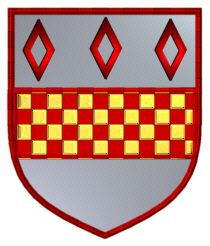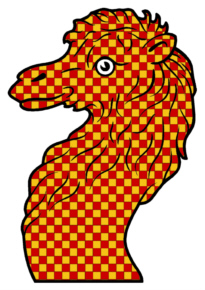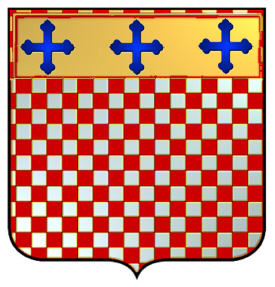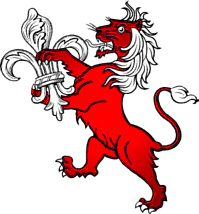Irish Origins:

Coat of Arms: A silver shield with a fess divided lozengy gold and red, in chief three red mascles, all within a red border bezantée.
Crest: A red camel's head couped, bezantée.
Mascle. Is of a lozenge form, but always perforated.
Bezant,
Besant or Besaunte. A round flat piece
of gold, which was the current coin of
Irish Origins:
Spelling variations include: Burgess, Burys and others.
First found in County Wexford, where one named Burgess was a witness to the Charter of Rosbercon in New Ross.
Some of the first settlers of this name or some of its variants were: Daniel Burgess and his wife and their eight children, who settled in Prescott, Ontario in 1825; Arthur Burgess, who immigrated to Quebec in 1850; and Ann and George Burgess, who arrived in Boston in 1847. A number of Burgesses landed in New York between 1840 and 1860.

Coat of Arms:
A shield chequey silver and red, with three blue crosses botonée on a gold chief.
Crest: A red lion holding a silver fleur de lis.
English Origins:
Spelling
variations include: Burgess, Burgeis, Burghersh, Burges, Burgesse,
Burgar, Bergiss, Bergess, Bargess, Bargeis, Bergeus, Burgeus, Burgeuss
and many more.
First found in Sussex where they are believed to be descended from the Barons Burghersh, which later became Burwash, a parish in that county.
Some of the first settlers of this name or some of its variants were: John Burges who arrived in Virginia in 1635; John and Rachel Burges settled in the Barbados in 1680 with their servants; Alexander Burgess arrived in Boston Mass. in 1851.- German, English, and Dutch: status name for a freeman of a borough, especially one who was a member of its governing council, a derivative of Middle High German burc, Middle English burg ‘(fortified) town’, Middle Dutch burch. The English name is found occasionally as a surname from the 13th century onwards but is not recorded as a vocabulary word until the 16th century. The usual English term was the Old French word burgeis ‘burgess’ (see Burgess). This name is frequent throughout central and eastern Europe. It also occurs as an Ashkenazic Jewish family name, but the reasons for its adoption are uncertain.
- German: habitational name for someone from any of the many places called Burg.
- Irish (of Anglo-Norman origin): habitational name from Burgh in Suffolk, England. This is named with Old English burh ‘fortification’, ‘fortified manor’.
- Norwegian: Americanized form of Børke, a habitational name from any of eight farms in southeastern Norway, named with Old Norse birki ‘birch wood’.
- German: variant of Burk.
http://genforum.genealogy.com/burgess
LOST TRIBES OF ISRAEL IDENTITY
![The Red Thread Coat of Arms sample coat of arms [full]](http://the-red-thread.net/genealogy/bailey-stationary.jpeg)
Sample Coat of Arms - Full
